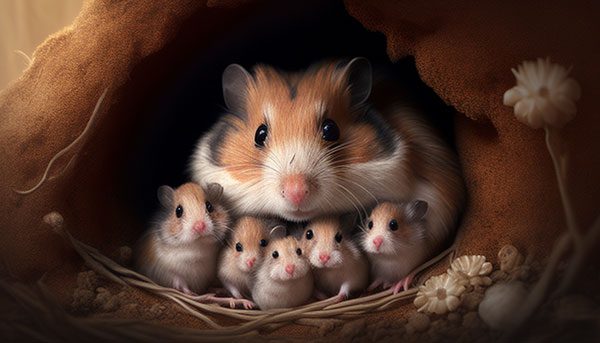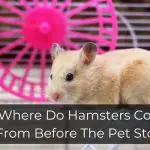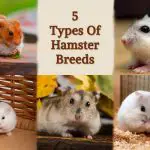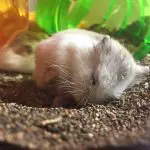Why Hamsters Eat Their Babies- Reasons And Prevention
Hamsters are cute and cuddly pets, but they can also be quite surprising at times. One such surprise is when they eat their babies. This behavior might seem shocking and unbelievable, but it is not uncommon in the world of hamster parenting.
So, why do hamsters eat their babies? The reasons may include
- Nutritional deficiencies
- Lack of nesting sites
- Environmental factors like overcrowding
- Territory invasion by predators
Also, while this behavior may seem cruel, it is actually a survival mechanism in the animal world.
Hence, in this piece, we will delve into the fascinating world of hamster behavior and discover the reasons behind this puzzling phenomenon. And how to prevent it. Read on.
Understanding Hamster Motherhood
Hamsters are known for their nurturing and loving nature towards their young. And it is a joy to observe the bond between a mother hamster and her offspring. Hamsters typically give birth to litters of 4-12 babies who are born blind and hairless.
The mother hamster is incredibly protective of her young and will fiercely defend them from any perceived threats. She will spend most of her time nursing and grooming her babies, making sure they are well-fed and comfortable.

As the babies grow and become more independent, the mother hamster will gradually wean them and begin to introduce them to solid food. She will also teach them essential life skills, such as foraging for food and building nests.
Why Do Hamsters Eat Their Babies?
While this may seem strange and even shocking, there are various reasons why cute and cuddly hamsters eat their offspring.

Territorial Behavior
Hamsters are naturally territorial creatures, and when they feel their territory is threatened, they may resort to eating their young. This behavior is more common in Syrian hamsters, who are solitary creatures and tend to become aggressive towards their offspring if they feel their space is being invaded.
Overcrowding
If the hamster’s cage is too small, or there are too many hamsters in the cage, the mother may feel threatened and eat her young to ensure her survival.
Lack of Nesting Material
Hamsters need a secure and cozy place to raise their young. However, if they do not have enough materials to make a proper nest, they may eat their babies as a way to protect them from danger.
Hormonal Imbalances
Hamsters are very sensitive animals and any changes in their environment or routine can trigger hormonal imbalances. This can cause the mother to become aggressive and eat her young.
Nutritional Deficiency
If a hamster is not receiving a balanced diet or lacks certain nutrients, such as calcium. They may not have enough nutrients to support the growth and development of their young, leading to cannibalism.

It is essential to ensure that your hamster has access to a nutritious diet and fresh water at all times.
Stress and Anxiety
Hamsters can become easily stressed, especially if they are kept in an environment that is not suitable for their needs. This can cause the hamster to engage in behaviors that are out of character, such as eating its offspring.
Illness Or Disease
If a hamster is sick or suffering from a disease, it may not have the strength to care for its young, leading to the consumption of its offspring. A sick baby hamster with a bad health condition can suffer cannibalism from the mother.
Sometimes the mother hamster does this to protect other babies from being infected. It’s instinctual for animals to care for only the ones they know will thrive; it’s truly the survival of the fittest.
Change In Scent
Hamsters have a highly developed sense of smell, and if they detect a change in the scent of their young, they may perceive them as a threat and eat them.
Inability To Care For All The Babies
It also happens when the mother hamster births more children than it can care for. Her inability to cater to all will push her to reduce the number by eating some of them.
The mother does this out of good for the rest of the babies to help them survive, even though it doesn’t look like a kind thing to do. Watch this video to learn why hamsters eat their babies.
How To Stop Hamsters From Eating Their Babies?
To prevent hamsters from eating their young, creating a suitable environment for the mother and her babies is important. Here are some actions you can follow:

Provide A Spacious Cage
Hamsters need enough space to move around, build nests, and raise their young. A cage that is too small or cramped can cause stress and lead to the mother eating her young.
Remove Every Threat
Make sure their cage is located in a safe place, void of danger. Remove every potential threat to their life and well-being and minimize noise as well.
Ensure Proper Nutrition
A diet that is lacking in essential nutrients (for example, calcium and protein) can lead to the mother eating her young. Feed your hamster a balanced diet that includes a variety of foods, such as hay, vegetables, and commercial hamster food pellets.
Minimize Stress
Handling the mother and her young too much can cause stress, which can lead to the mother eating her young. Limit your interactions with the mother and her babies and be gentle and calm when you do.
Provide Appropriate Bedding
Soft, warm bedding is essential for the mother and her young. Provide a nesting area where the mother can build a comfortable nest for her babies.

Observe The Mother And Her Young
Regularly observe the mother and her young to ensure that they are healthy and that the mother is caring for her babies properly. If you suspect that the mother is not caring for her young, seek advice from a veterinarian or a professional breeder.
Seek Veterinary Help if Necessary
If you suspect that your hamster is suffering from a health problem or is experiencing stress, it’s important to seek veterinary help. Your veterinarian can help diagnose the issue and provide the necessary treatment to ensure your hamster and her young are healthy and thriving.
If you’re a hamster owner, you know how important it is to understand your pet’s behavior and health needs. If you’re wondering how long your hamster can be left alone or how to tell if your hamster is pregnant, we have the answers for you. Our article on how long hamsters can be left alone provides valuable information about the maximum time your pet can stay alone without any harm. Meanwhile, our article on how to tell if a hamster is pregnant offers tips and tricks to help you identify this condition in your pet. By reading these articles, you’ll be better equipped to provide your hamster with the care it needs. So, go ahead and check them out!FAQs
Read this section to have further information on hamsters eating own babies.
Q. Why shouldn’t you touch hamster babies?
When you touch hamster babies, the scent of your body is left on their skin. The mother hamster can get confused with the new scent and may not recognize her babies. She may kill them.
Q. Why is my hamster biting her babies?
Lack of maternal experience, instincts, or an attempt to cull weak or sickly offspring. Sometimes, the mother may exhibit aggressive behavior due to illness. Also, they can bite their young to defend themselves if they feel threatened.
Q. Why do hamsters reject their babies?
Hamsters may reject their babies due to stress, illness, or an overcrowded cage. It is also possible that the hamster senses that the babies are weak or stillborn and may reject them. This is to conserve her energy and resources for healthier offspring.
Conclusion
While the act of hamsters eating their young can be distressing, it is a natural response to various environmental and biological triggers. It is essential to understand these triggers and provide your hamster with a healthy and stress-free environment to prevent this behavior.
As a hamster owner, it is important to ensure that these little creatures are well taken care of and have access to the resources they need to thrive. By understanding the reasons behind this behavior, you can work towards creating a safe and nurturing environment for your hamster friends




